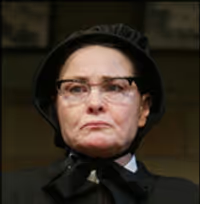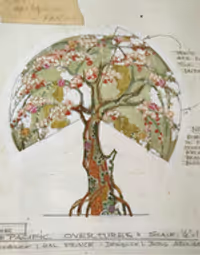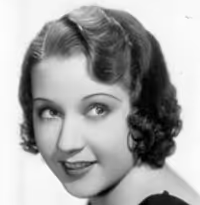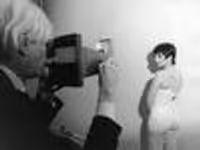Jennifer Lopez to Star in KISS OF THE SPIDER WOMAN Film
aburnedhill
Swing Joined: 9/14/22
#475Jennifer Lopez to Star in KISS OF THE SPIDER WOMAN Film
Posted: 9/16/25 at 12:42pm
shomeika said: "There is an early screening in Palm Springs tonight and one soon in NYC. Hopefully feedback will be shared."
Thanks for the info! I just snatched up one of the last available seats for tonight's screening in Palm Springs. I am a local and had no idea it was happening. Should be a fun night out! I will try to get my thoughts together in a somewhat educated fashion and post them here later. Bill Condon is holding a talkback afterwards as well. Will be interesting.
Rentaholic2
Broadway Legend Joined: 3/14/04
#476Jennifer Lopez to Star in KISS OF THE SPIDER WOMAN Film
Posted: 9/16/25 at 1:26pm
joevitus said: "Jeffrey Karasarides said: "I can't help but think of how if Bob Fosse was making his Cabaret movie today and word got out how he wasn't usingany of the book numbers from the stage version, many would be reacting on social media like "Are you f***ing kidding me?!.""
I don't think there would have beenmuch of a reaction. How many of those book songs count among people's favorites? But as has already been pointed out, the film of Cabaret is more it's own thing than a Broadway-to-Hollywood adaptation."
I agree, the songs that were cut from Cabaret are pretty ho-hum. I'm much more sad about the loss of the book songs in Spider Woman, several of which are thrilling.
#477Jennifer Lopez to Star in KISS OF THE SPIDER WOMAN Film
Posted: 9/16/25 at 2:30pm
In praise of 7 Roles That Explain Why Jennifer Lopez’s Life Is Her Greatest Art
Her casting in the forthcoming “Kiss of the Spider Woman” underscores how her best onscreen work has always been informed by what’s happening offscreen.
https://www.nytimes.com/2025/09/14/movies/jennifer-lopez-best-performances.html?unlocked_article_code=1.mU8.ItjC.hp_JgUz-rCLt&smid=url-share
#478Jennifer Lopez to Star in KISS OF THE SPIDER WOMAN Film
Posted: 9/16/25 at 6:16pm
Yes, there is an early screening in NYC - but it's sold out. https://www.nypl.org/events/programs/2025/10/08/kiss-spider-woman
joevitus said: "Jeffrey Karasarides said: "I can't help but think of how if Bob Fosse was making his Cabaret movie today and word got out how he wasn't usingany of the book numbers from the stage version, many would be reacting on social media like "Are you f***ing kidding me?!.""
I don't think there would have beenmuch of a reaction. How many of those book songs count among people's favorites? But as has already been pointed out, the film of Cabaret is more it's own thing than a Broadway-to-Hollywood adaptation."
#479Jennifer Lopez to Star in KISS OF THE SPIDER WOMAN Film
Posted: 9/16/25 at 10:06pm
theatreguy12 said: "
In the movie, he seemed to be drawn in by Molina from almost the get go, so when it came time for them to come together, if you had never seen it before, you were like, well I saw that coming from over an hour ago. You could see how captivated and engaged Valentin was from almost the beginning. Again, Crivello played it as more resistant as I recall. But those who rememberthe original production with more clarity than I might be able to correct me if I'm wrong.
"
I saw, and was thrilled by, the tour with Chita in Vancouver when I was 13--my grandma insisted on taking me, saying I needed to see Chita live at least once, though we never discussed what it was actually about. But I admit, listening to both cast albums so often (the original has my fave cast, but the Vanessa, produced by the great Thomas Z Shepard is a better representation of the score) I can't really remember concrete details of how everything was played out.
But in James Leve's critical study book on Kander and Ebb (where he's a bit unfairly harsh towards Kiss--his point being that it misses a lot of the points of the novel) he says one of the frustrating changes between the disastrous Purchase production and the subsequent Livent one, was emphasizing the fact that the sex is very much a transaction for Valentin with absolutely no ambiguity there (Leve implies there was more so in the Purchase production, though I can't tell from a bootleg...) So that's interesting...
#480Jennifer Lopez to Star in KISS OF THE SPIDER WOMAN Film
Posted: 9/16/25 at 10:17pm
John Adams said: "
Although I’m familiar with the OBC recording of the musical, I’ve never seen the Broadway musical. I’m only familiar with the 1985 movie starring William Hurt, Raul Julia and Sonia Braga. I liked the script, but I absolutely hated the performances, especially William Hurt as Molina.
Roger Ebert gave the movie 3½ stars and praised Hurt’s performance saying, “William Hurt, who won the best actor award at Cannes this year for this film, creates a character utterly unlike anyone else he has ever played – a frankly theatrical character, exaggerated and mannered – and yet he never seems to be reaching for effects.”
I agree that Hurt “never seems to be reaching for effects”, although I would more bluntly interpret that as, Hurt “never seems to reach a realistic authenticity”.
"
The musical was my first exposure to the story back when I was 13, but I loved it so much that I did then rent the movie and eventually read the book, and frankly I think the movie is a pretty terrible adaptation (and I felt this back in the 90s--) And, yes, my main issue is with Hurt (who I believe in one interview said he approached the role as a woman.) It is interesting that the movie made the movie within the movie one continuous work, as does this musical movie and as did the original Purchase production--one thing people found so confusing was trying to follow the convoluted movie plot along side the overall plot--so of course, wisely, that was one of the myriad changes for the eventual Livent production. But, I can understand why Condon changed this again for his movie.
(The original novel, which I should re-read, I believe pulled from a bunch of movies whose stories begin to thematically increasingly reflect Molina and Valentin's situation, but of course the novel itself is written in a very stream of conscious way, and also goes on many diatribes--about the nature of sexuality, politics, connections between... Stuff that's hard to dramatize--interestingly originally Hal Prince had asked Puig to write the book--he had already written a play version-- but I believe what he wrote was seen as unusable, and VERY long--he did give his blessing for McNally to take over, though he passed away before seeing either version of the musical.)
I'm curious about your comments about Molina being presented as trans--it sounds like it's implied to a degree but left ambiguous? Of course this brings up issues like what it would mean to be trans in their time and place anyway, etc. I admit I feel like a horrible, old conservative gay guy when I say that the way I always say it was Molina is a very flamboyant, gay man, and I don't think that always should be read as trans to modern viewers--I never thought the lyrics of She's a Woman were meant to say that Molina wished they were literally a woman. I am sure others completely disagree with me.
#481Jennifer Lopez to Star in KISS OF THE SPIDER WOMAN Film
Posted: 9/16/25 at 11:06pm
Eric, so nice to see your post, old friend. Yours is one of the voices I miss most when I see how few posters from the past still contribute to BWW these days. But I digress.
Condon’s new film script makes quite explicit that Molina wants to not only fall in love with a man, but to fully become a woman if he could, so much so, that by the time we get to the finale of “Only in the Movies”, Molina appears as both a handsome man AND his fantasy of a glamorous technicolor woman who blends in with the gorgeous ladies ensemble all around him, well— her.
( And as I’ve posted earlier, no, this shift doesn’t work for me either. Molina has always been a gay man in my understanding of the story. Making him trans is simply someone else’s story.)
#482Jennifer Lopez to Star in KISS OF THE SPIDER WOMAN Film
Posted: 9/17/25 at 12:13am
I don't really like the idea of making Molina trans--it doesn't represent either how Puig or later McNally conceptualized the character. And it feels uncomfortably reductive. Because, yes, there were, are and always will be effeminate gay men who do not view themselves as trans women. Effeminate doesn't equal trans. It makes me wonder if, in the future, looking over the diaries, recorded conversations, etc. of men from our era and earlier eras who used terms like "she" or "sister" or "Mary" or whatever are going to be interpreted for future generations as "actually trans," when in fact it is just the language of some members of the gay community.
BUT we are in a period that is so hateful to trans people that I absolutely LOVE a major movie musical with a trans woman at its center--and one much more likely to gain mainstream interest than, you know, that previous one.
#483Jennifer Lopez to Star in KISS OF THE SPIDER WOMAN Film
Posted: 9/17/25 at 2:46am
I would argue the musical quite explicitly develops Molina's envy of Aurora for being a woman ("She's a Woman"), nearly as much as sexuality.
This lyric is not just about kissing men, or that being the sole privilege a woman has.
I'm genuinely not sure how else you interpret it...
However, I agree it;s absolutely true Puig and McNailly/Kander/Ebb didn't conceive of Molina as trans. It was a different time, in both times. And you could argue you should never view art through the lens of today to argue intention. But today, this is exactly how you would write a song for a prisoner who wished to live openly trans:
[MOLINA]
She wears satin
Spanish lace
She feels wild chinchilla brush
Across her face
She's lucky
She’s a woman
She wears diamonds
Bright as stars
She has lovers open doors to fancy cars
She's lucky, so lucky
She's a woman
A perfume by Lanvin
To dab across her wrist
A secret ribboned diary
Of all the men she’s kissed
So many men she's kissed
Lilac waters
Bathe her skin
At the opera, ushers gasp
When she sweeps in
Gifts of chocolate
Roses, too
Hand-delivered notes
Confessing "I love you"
Milky lotions
Scented creams
She's the climax
Of your technicolor dreams
How lucky can you be?
So lucky you will be
And I wish that she were me
That woman
#484Jennifer Lopez to Star in KISS OF THE SPIDER WOMAN Film
Posted: 9/17/25 at 5:43am
Someone in a Tree2 said: "Eric, so nice to see your post, old friend. Yours is one of the voices I miss most when I see how few posters from the past still contribute toBWW these days. But I digress."
Thanks for those kind words! And the feeling is mutual.
I really should stop commenting on this until I've seen the movie, but that is somewhat disappointing to me just because, as you say, I feel it does change a key element.
Again, I feel uncomfortable stating my opinion too strongly on this, but I will say it does seem like we've reached a moment 9in time where when a particularly feminine presenting (for lack of a better word) gay man from a different place and era (in fiction or history) is approached in a contemporary work, it's almost the default thinking to say "Well, we now recognize that they more likely than not would be considered trans or at the least non-binary, so we'll approach it that way," which I find unsatisfying for a myriad different reasons. And I'm sure people will find this way of thinking "problematic" but I realize a part of that too is that you take one of the first unapologetically gay lead characters in a mainstream Broadway musical (something we *still* don't have a lot of) and turn it into a trans role (and yes, that's something we don't have much of either.)
BJR, I really appreciate your post and I think I completely get where you're coming with (especially how that song would read to contemporary audiences--I guess since it's not in the movie it's a bit of a moot point.) (And yes, part of that is that Molina is a complicated character, and not just a gay man to emulate. I recently came across one review of the film--and I can't remember which one--where the critic was upset that as written, Molina made disparaging remarks about the appearance of certain actresses, etc--like that bitchy and sympathetic element to his character took away from our sympathies with them--honestly, a take on how gay characters should be written that I thought we had moved past.)
I feel like perhaps I'm simply being totally naive, but when I first heard She's a Woman, I simply didn't talk it so literally--more just a sense that Molina wanted to be "allowed" to have all of these (cliche?) feminine qualities and not have it questioned. OK, I'm having trouble working what exactly I mean, but...
#485Jennifer Lopez to Star in KISS OF THE SPIDER WOMAN Film
Posted: 9/17/25 at 7:09am
EricMontreal22 said: "I feel like perhaps I'm simply being totally naive, but when I first heard She's a Woman, I simply didn't talk it so literally--more just a sense that Molina wanted to be "allowed" to have all of these (cliche?) feminine qualities and not have it questioned. OK, I'm having trouble working what exactly I mean, but..."
I second BJR's post about how lovely it is to see you, Eric, on this board.
I saw the show in previews in 1993 (1993, right?) and I remember that moment in She's a Woman and I thought 'Huh...I wonder if this character is figuring out they're 'transsexual' (the word we used back that).' I actually love the complicated questions around gender the character has always inspired and the fact that there isn't necessarily a clear cut answer fascinates me.
#486Jennifer Lopez to Star in KISS OF THE SPIDER WOMAN Film
Posted: 9/17/25 at 9:39am
Actually “She’s a Woman” is most definitely in the film, and takes up a major slot of the score (it combines with “Her Name is Aurora” to fully introduce Jennifer Lopez’s character to Valentin and us, the audience.) Yet I agree with Eric that the emotions in the song could just as easily be those of a gay man who envies a woman her place on the highest pedestal in the world as Molina understood it; it need NOT be the song of a man who wants to stop being a man and become biologically female.
In 1991 when K&E were writing the score and Terrence McNally the book, the concept of a transsexual was quite well known (Christine Jorgensen had been around since the ‘50’s.) If they had wanted to create a character like that for Molina, I’m quite sure they would have written exactly that.
#487Jennifer Lopez to Star in KISS OF THE SPIDER WOMAN Film
Posted: 9/17/25 at 9:55am
BJR said: "I would argue the musical quite explicitly develops Molina's envy of Aurora for being a woman ("She's a Woman"), nearly as much as sexuality.
This lyric is not just about kissing men, or that being the sole privilege a woman has.
I'm genuinely not sure how else you interpret it...
However, I agree it;s absolutely true Puig and McNailly/Kander/Ebb didn't conceive of Molina as trans. It was a different time, in both times. And you could argue you should never view art through the lens of today to argue intention. But today, this is exactly how you would write a song for a prisoner who wished to live openly trans:
[MOLINA]
She wears satin
Spanish lace
She feels wild chinchilla brush
Across her face
She's lucky
She’s a woman
She wears diamonds
Bright as stars
She has lovers open doors to fancy cars
She's lucky, so lucky
She's a woman
A perfume by Lanvin
To dab across her wrist
A secret ribboned diary
Of all the men she’s kissed
So many men she'skissed
Lilac waters
Bathe her skin
At the opera, ushers gasp
When she sweeps in
Gifts of chocolate
Roses, too
Hand-delivered notes
Confessing "I love you"
Milky lotions
Scented creams
She's the climax
Of your technicolor dreams
How lucky can you be?
So lucky you will be
And I wish that she were me
That woman"
That lyric surely helped inspire the change in characterization for the movie. But one of Puig's conceits in the novel is that Molina identifies with/emulates women because his society gives him no images of men loving men to model himself on. He acts like a woman because he only has images of women showing their desire/preference for men. And there's a long history of that in gay culture (obvioulsy the bulk of it pre-Stonewall). But I do not think this is the same thing as identifying as trans.
Anyway, the movie has made this change, and while I don't agree with the choice, it isn't something that's going to keep me from seeing it.
#488Jennifer Lopez to Star in KISS OF THE SPIDER WOMAN Film
Posted: 9/17/25 at 1:52pm
Hi!
I am stepping in here to say how refreshing it is to see board members discussing their opinions with respect to one another.
You don't see that a lot around these parts.
And I add myself to the chorus of voices that are happy to see EricMontreal22 back here again!
Carry on! ![]()
#489Jennifer Lopez to Star in KISS OF THE SPIDER WOMAN Film
Posted: 9/17/25 at 3:10pm
Unlike the original Broadway production where Chita Rivera contended (and won) as lead at the Tonys, Jennifer Lopez will officially be campaigning for a Best Supporting Actress Oscar nomination.
https://www.goldderby.com/film/2025/jennifer-lopez-supporting-actress-kiss-of-the-spider-woman/
#490Jennifer Lopez to Star in KISS OF THE SPIDER WOMAN Film
Posted: 9/17/25 at 4:45pm
Jeffrey Karasarides said: "Unlike the original Broadway production where Chita Rivera contended (and won) as lead at the Tonys, Jennifer Lopez will officially be campaigning for a Best Supporting Actress Oscar nomination.
https://www.goldderby.com/film/2025/jennifer-lopez-supporting-actress-kiss-of-the-spider-woman/"
That makes sense. Nowadays, that’s a frequent way to get someone with a very large role but not the sole narrative a nomination, since the leading categories are often heavily stacked, and with people who carry the whole movie.
I absolutely see what everyone is saying about Molina and gender! I’m not advocating for any one definitive take. But I do think it’s a worthwhile discussion because indeed no one can argue that the intention of Puig or McNally or Ebb was for Molina to be trans. But then, their understanding of the trans experience would’ve been different then. (And a real life person experiencing the exact same feelings as Molina did then, could now classify themselves differently today.) So it’s a debate that’s often had amongst art historians / critics about whether/how to apply our understanding of our own times on a work of another era. And there’s no right answer.
#491Jennifer Lopez to Star in KISS OF THE SPIDER WOMAN Film
Posted: 9/17/25 at 6:44pm
EricMontreal22 said: "I'm curious about your comments about Molina being presented as trans--it sounds like it's implied to a degree but left ambiguous? "
Just for clarity, I didn't comment on Molina possibly being trans. I wonder if you might have meant to quote/respond to Someone in a Tree2 who had written, "The script struggles to find a trans take on the character wanting to live fully as a woman" (post# 460)?
I kind of wish it was my comment, because it opened up some interesting viewpoints. ![]()
#492Jennifer Lopez to Star in KISS OF THE SPIDER WOMAN Film
Posted: 9/17/25 at 7:13pm
Jeffrey Karasarides said: "Unlike the original Broadway production where Chita Rivera contended (and won) as lead at the Tonys, Jennifer Lopez will officially be campaigning for a Best Supporting Actress Oscar nomination."
I'm not a fan of that practice. I didn't care for it when "The Bear" contended in the Comedy category at the Emmys, either. For me, it just feels like a way of stacking the deck to win an award.
#493Jennifer Lopez to Star in KISS OF THE SPIDER WOMAN Film
Posted: 9/17/25 at 7:28pm
John Adams said: "Jeffrey Karasarides said: "Unlike the original Broadway production where Chita Rivera contended (and won) as lead at the Tonys, Jennifer Lopez will officially be campaigning for a Best Supporting Actress Oscar nomination."
I'm not a fan of that practice. I didn't care for it when "The Bear" contended in the Comedy category at the Emmys, either. For me, it just feels like a way of stacking the deck to win an award."
The character isn't a lead though.
#494Jennifer Lopez to Star in KISS OF THE SPIDER WOMAN Film
Posted: 9/17/25 at 9:05pm
^Agreed. Aurora/Spiderwoman is the sparkly object in the cast, but honestly her screen time does not merit a lead designation as far as I can tell. There is really only one lead in this film and that is Tonatiuh as Molina. When Aurora sings "...My Leading Man..." to him, she is correct about his status, if not her own.
#495Jennifer Lopez to Star in KISS OF THE SPIDER WOMAN Film
Posted: 9/17/25 at 10:37pm
I have a question about the two cast recordings. Is the reprise of "Morphine Tango" missing from the Vanessa Williams revival because they just oddly left it off, or is it something that luckily was captured because the original cast was recorded in London, and it was dropped for the Broadway transfer?
#496Jennifer Lopez to Star in KISS OF THE SPIDER WOMAN Film
Posted: 9/17/25 at 10:55pm
BJR said: "
I absolutely see what everyone is saying about Molina and gender! I’m not advocating for any one definitive take. But I do think it’s a worthwhile discussion because indeedno one can argue that the intention of Puig or McNally or Ebb was for Molinato be trans. But then, their understanding of the trans experiencewould’ve been different then. (And a real life personexperiencing the exact same feelings as Molina did then,could now classify themselves differently today.) So it’s a debate that’s often had amongst art historians / critics about whether/how to apply our understanding of our own times on a work of another era. And there’s no right answer."
I think your last line is particularly apt. Puig was evidently interested in looking at the concept of gender-as-construct in terms of both men, and while that doesn't mean Molina was "really" trans, it makes the subject of gender and how gender is defined much more complex and open to question and opens the door for ideas about the the character being trans.
AEA AGMA SM
Broadway Legend Joined: 8/13/09
#497Jennifer Lopez to Star in KISS OF THE SPIDER WOMAN Film
Posted: 9/17/25 at 11:10pm
joevitus said: "I have a question about the two cast recordings. Is the reprise of "Morphine Tango" missing from the Vanessa Williams revivalbecause they just oddly left it off, or is it something that luckily was captured because the original castwas recorded in London, and it was dropped for the Broadway transfer?"
I can’t find my copy of the script to check to see what has been in the licensed script, but in the Playbill that’s on Playbill Vault the Morphine Tango Reprise is not listed, so it may indeed have been cut between London and Broadway. And of course since I’ve listened to the original recording so much, I don’t trust my memory of seeing the tour some 30 years ago as to whether it was in then or not
#498Jennifer Lopez to Star in KISS OF THE SPIDER WOMAN Film
Posted: 9/18/25 at 10:38am
AEA AGMA SM said: "I can’t find my copy of the script to check to see what has been in the licensed script, but in the Playbill that’s on Playbill Vault the Morphine Tango Reprise is not listed, so it may indeed have been cut between London and Broadway. And of course since I’ve listened to the original recording so much, I don’t trust my memory of seeing the tour some 30 years ago as to whether it was in then or not"
Thank you!
#499Jennifer Lopez to Star in KISS OF THE SPIDER WOMAN Film
Posted: 9/18/25 at 10:54am
TheatreFan4 said: "The character isn't a lead though."
True (and thank you!) I do wonder, though about where J.Lo's name and likeness will appear on a finalized poster for the movie (similar to where how a Broadway actor might be billed on a marquee).
I wonder about that because I'm not sure how that effects pay or status regarding consideration as "leading"/"supporting" in the world of movies vs stage.
Currently, I can only find un-finalized versions of the poster like this:
It looks like she's being advertised as the draw/star. Will a finalized poster indicate how the studio is marketing her regarding the status of her role?
Videos












